人教版英语必修二:Unit2-Olympic-Games
- 格式:ppt
- 大小:4.07 MB
- 文档页数:14
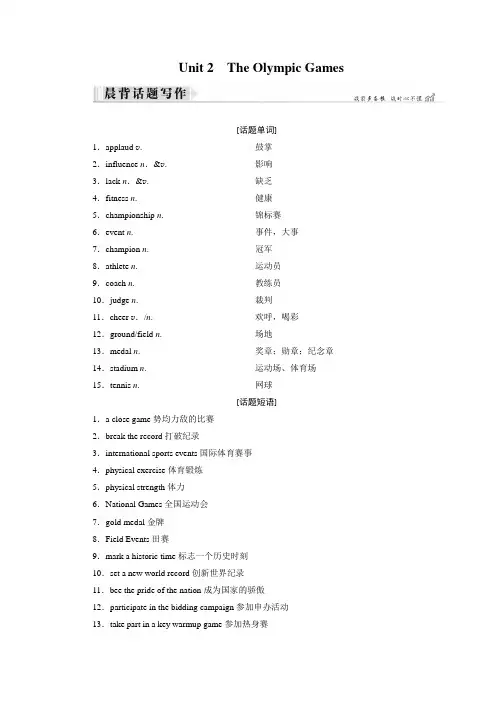
Unit 2The Olympic Games[话题单词]1.applaud v. 鼓掌2.influence n.&v. 影响3.lack n.&v. 缺乏4.fitness n. 健康5.championship n. 锦标赛6.event n. 事件,大事7.champion n. 冠军8.athlete n. 运动员9.coach n. 教练员10.judge n. 裁判11.cheer v./n. 欢呼,喝彩12.ground/field n. 场地13.medal n. 奖章;勋章;纪念章14.stadium n. 运动场、体育场15.tennis n. 网球[话题短语]1.a close game势均力敌的比赛2.break the record打破纪录3.international sports events国际体育赛事4.physical exercise体育锻炼5.physical strength体力6.National Games全国运动会7.gold medal金牌8.Field Events田赛9.mark a historic time标志一个历史时刻10.set a new world record创新世界纪录11.bee the pride of the nation成为国家的骄傲12.participate in the bidding campaign参加申办活动13.take part in a key warmup game参加热身赛14.reach the standard for international games达到国际体育标准15.watch a volleyball/badminton game观看排球(羽毛球)比赛[话题佳句]1.There is a famous saying:“Life lies on exercise.”有一句谚语:“生命在于运动”。
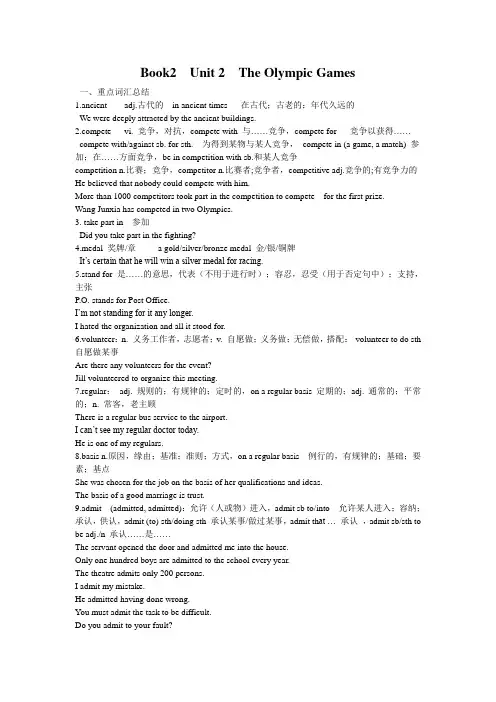
Book2 Unit 2 The Olympic Games一、重点词汇总结1.ancient adj.古代的in ancient times 在古代;古老的;年代久远的We were deeply attracted by the ancient buildings.pete vi. 竞争,对抗,compete with 与……竞争,compete for 竞争以获得……compete with/against sb. for sth. 为得到某物与某人竞争,compete in (a game, a match) 参加;在……方面竞争,be in competition with sb.和某人竞争competition n.比赛;竞争,competitor n.比赛者;竞争者,competitive adj.竞争的;有竞争力的He believed that nobody could compete with him.More than 1000 competitors took part in the competition to compete for the first prize.Wang Junxia has competed in two Olympics.3. take part in 参加Did you take part in the fighting?4.medal 奖牌/章 a gold/silver/bronze medal 金/银/铜牌It’s certain that he will win a silver medal for racing.5.stand for 是……的意思,代表(不用于进行时);容忍,忍受(用于否定句中);支持,主张P.O. stands for Post Office.I’m not standing for it any longer.I hated the organization and all it stood for.6.volunteer:n. 义务工作者,志愿者;v. 自愿做;义务做;无偿做,搭配:volunteer to do sth 自愿做某事Are there any volunteers for the event?Jill volunteered to organize this meeting.7.regular:adj. 规则的;有规律的;定时的,on a regular basis 定期的;adj. 通常的;平常的;n. 常客,老主顾There is a regular bus service to the airport.I can’t see my regular doctor today.He is one of my regulars.8.basis n.原因,缘由;基准;准则;方式,on a regular basis 例行的,有规律的;基础;要素;基点She was chosen for the job on the basis of her qualifications and ideas.The basis of a good marriage is trust.9.admit (admitted, admitted):允许(人或物)进入,admit sb to/into 允许某人进入;容纳;承认,供认,admit (to) sth/doing sth 承认某事/做过某事,admit th at … 承认,admit sb/sth to be adj./n 承认……是……The servant opened the door and admitted me into the house.Only one hundred boys are admitted to the school every year.The theatre admits only 200 persons.I admit my mistake.He admitted having done wrong.You must admit the task to be difficult.Do you admit to your fault?10.as well 也,又,还Air is necessary for people; it is necessary for plants as well.11.host :vt. 做东,主办;n. 主人,东道主He is willing to host the visitors.He acted as host to his father’s friend s.12.responsibility:n.责任,负责,responsibility for (doing) sth/ to do sth (做)……责任;对……负责,take responsibility for (doing) sth 对……负责任take on the responsibility 承担责任; (n.) 职责;义务;任务responsibility to sb 对某人负责,responsibility to do sth 做某事的责任,a sense of responsibility 责任感,responsible adj. 有责任的,有义务的;可信赖的They have responsibility for ensuring that the rules are enforced.She feels a strong sense of responsibility to help these countries.13.replace vt.代替,取代,replace sth/sb 取代某物/某人,replace sth/sb with/by 以……代替某物/某人;替换;replace sb/sth = take the place of sb/sth = take sb’s /sth’s place 取代,替代Can anything replace a mother’s love?If he can’t manage he’ll have to be replaced.14.charge vt. 收费,要价,charge sb/sth for sth 因……而向某人收费, charge sb sth for sth 因……而向某人收……费;vt. 指控,控告;起诉;指责;charge sb with sth 指控某人某事;charge sb with doing sth 指控某人做了事; n. 要价,收费,charge for sth ……的收费,free of charge 免费;n. 主管,掌管,责任take charge of 负责,掌管,in charge of 主管,掌管, in the charge of 被掌管What did they charge for the repairs?He was charged with murder.Delivery is free of charge.He took charge of the farm after his father’s death.15.fine vt. 罚款,处某人以罚金,fine sb for sth 因……而罚某人的款;n. 罚金,罚款;adj. 可接受的,满意的He was fined for speeding.She has already paid over ﹩2000 in fine.I’ll leave this here, ok? Fine.16.advertise vt. 为……做广告;登广告,advertise sth 登广告宣传某物,advertise for sb/sth 为征求……登广告; advertisement = ad 广告; advertising n. 广告,广告业They advertise their new product on TV.The company is advertising for typists in the newspapers.17.bargain v. 讨价还价,商讨条件,bargain with sb over/about/for sth 就某物与某人讨价还价;n.便宜货;n. 协议;交易:make a bargain with sb about sth 与某人就某事/物达成协议He was bargaining with the shop owner over the price.The car was a bargain at that price.18. one after another 一个接一个地;依次地Strange things happened one after another.19. deserve v. (不用于进行时态)值得,应得,应受You deserve a rest after all that hard work.What have I done to deserve this?注意:deserve后接doing或动名词的主动形式表示被动意义,等于接不定式的被动语态。
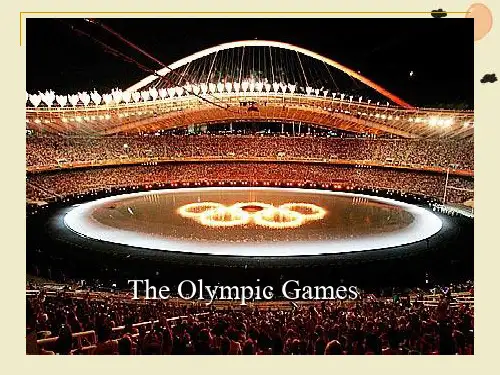
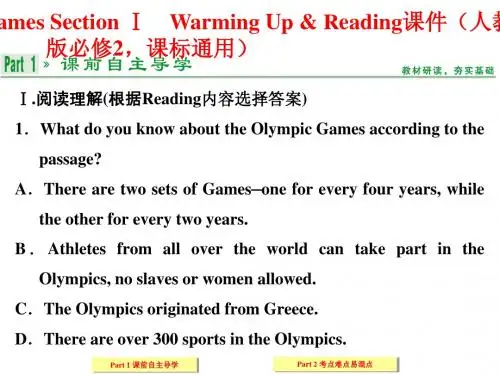
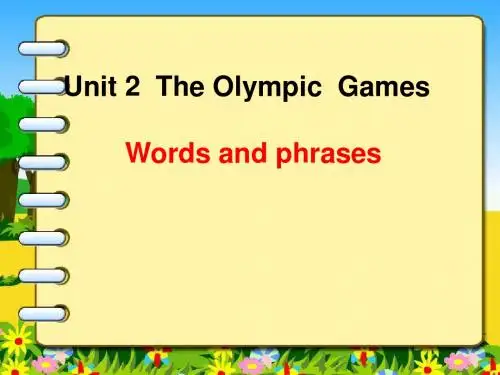
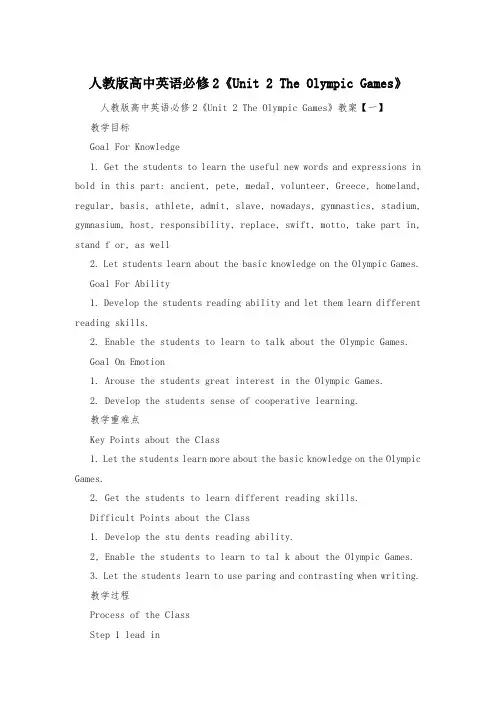
人教版高中英语必修2《Unit 2 The Olympic Games》人教版高中英语必修2《Unit 2 The Olympic Games》教案【一】教学目标Goal For Knowledge1. Get the students to learn the useful new words and expressions in bold in this part: ancient, pete, medal, volunteer, Greece, homeland, regular, basis, athlete, admit, slave, nowadays, gymnastics, stadium, gymnasium, host, responsibility, replace, swift, motto, take part in, stand f or, as well2. Let students learn about the basic knowledge on the Olympic Games. Goal For Ability1. Develop the students reading ability and let them learn different reading skills.2. Enable the students to learn to talk about the Olympic Games. Goal On Emotion1. Arouse the students great interest in the Olympic Games.2. Develop the students sense of cooperative learning.教学重难点Key Points about the Class1. Let the students learn more about the basic knowledge on the Olympic Games.2. Get the students to learn different reading skills.Difficult Points about the Class1. Develop the stu dents reading ability.2, Enable the students to learn to tal k about the Olympic Games.3. Let the students learn to use paring and contrasting when writing.教学过程Process of the ClassStep 1 lead in1. IntroductionAs we know, the ancient Olympic Games took place in Olympia in Greece every four years between 776BC and 339BC. Only men and boys could pete in the ancient Olympic Games. Married women were not even allowed to watch the Games; only young girls, boys and men could watch.However, in modern times, there are two main sets of Gamesthe Summer and Winter Olympics, and both are held every four years. Athletes from any country who have reached the agreed standard for their event will be admitted as petitors. Therefore, there are many significant differences between the modern and ancient Olympics, although certain similarities exist.In this text, Pausanias, an ancient Greek writer, has e on a magical journey to find out more about the ancient and modern Olympics. Has he got what he wants to know? I think you have got the answer. OK. First, lets do a survey about Olympics.Reflection:This part is to introduce the students to the text briefly to make the text easy for them to read.6. How many main kinds of the Olympic Games are there in the world?7. What is the motto of the Olympic Games?8. What is the host city of the first Olympics?9. What is the host city of the 202X Olympics?10. What is the host city of the 202X Olympics?Suggested keys:1-5 CBCDC6. Two. They are the Summer Olympic Games and the Winter Olympic Games.7. Higher, swifter and stronger.8. Athens, Greece.9. Athens, Greece.10. Beijing, China.Reflection:This part is to arouse the interests of the students on Olympic Games and get them into the reading slowly.Step 2 Pre-readingAsk the students to look at the title of the text and the pictures in it and talk about them.1) TitleAn InterviewAn interview is a meeting in which someone is asking another one some questions in order to find out about their actions or opinions.2) The first picture in the textThe first picture is the statue of a great Greek. His name is Pausanias. He was a famous traveler and writer in the second century AD.3) The second picture in the textThe second picture is a Chinese athlete named Yang Yang. She won a gold medal for China at the 202X Winter Olympic Games. She is a famous skating player.4) The third picture in the textThe third picture is the opening ceremony of the Olympic Games. Maybe this is the main stadium. Its large and can hold thousands of audience. See in the sky the five white rings? They are the Olympic Five Rings which stand for the five continentsAsia, Africa, the Americas, Europe and Oceania.Reflection:This step is to help the students make a further understanding of the text.Step 3 Readingprehending1 . Reading for the main ideaWhat does the passage mainly tell about?Suggested answer:This text mainly tells about the similarities and the differences between the ancient and modern Olympic Games.2. Reading for detailed informationAsk the students to read this text carefully to locate detailed information and then choose the best answer.1) Where do all the petitors live?A. A hotel.B. A special village.C. A restaurant.D. A place hired by petitors.2) Why do many countries want to host the Olympic Games?A. To run faster, jumper higher and throw further.B. To get a great honour.C. To make the country famous.D. To make money.3) Which of the following is included in the Winter Olympic Games?A. Skiing and ice skating.B. Running races.C. Horse riding.D. Swimming.4) The last Olympic Games were held in _________.A. BeijingB. AtlantaC. AthensD. Sydney5) Why does Pausanias think people may be peting for money in the modern Olympic Games?A. Because the winner can get medals.B. Because the winner can be awarded lots of money by their own countries.C. Because the olive wreaths have been replaced by medals.D. Because medals are made of gold.Suggested answers: 1)–5) BBACCReflection:This part is to check if the students have truly understood the text.3. Read the passage carefully and answer the following questions.1) What amazes Pausanias about the Olympic Games?2) Why does he think Athens and Beijing should feel proud?Keys:1) Pausanias is amazed that many countries take part in the Olympics and women too and there are two sets of Olympics.2) Its a great honour to host the Olympics.Reflection:This part is to enable the students to have a deep understanding of the text by answering some difficult questions.Keys:1. one2. women; slaves3. Greece4. two5. reached; agreed standard6. anywhere in the worldReflection:This part is to strengthen the key content in the text.5. Summary writing 归纳写作Answer these questions in not more than 100 words.回答下列问题,将答案组成一个段落,不要超过100个单词。
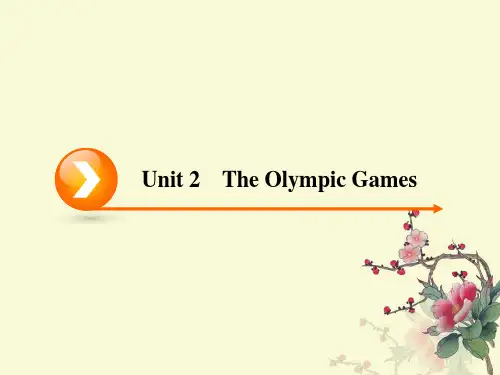
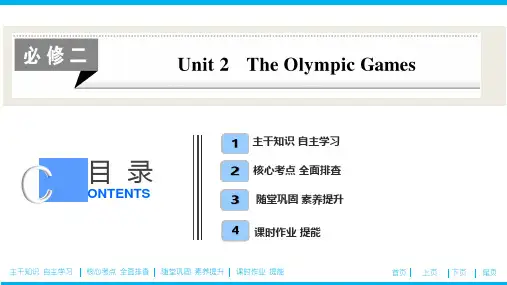

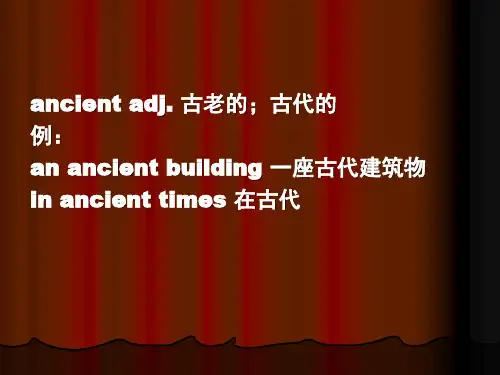
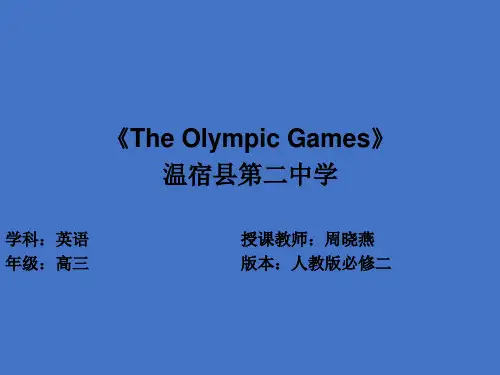
高一英语同步练习必修2 Unit 2 The Olympic Games第2课时 Reading基础练习阅读理解Baron Pierre de Coubertin was a Frenchman. At his time sports were not taught in French schools. De Coubertin believed that sports should go hand in hand with studies. He had an idea. His idea was to begin the Olympics all over again.Sports teachers of other countries liked de Coubertin’s ideas. So in 1896, the modern Olympic Games were held in Athens, Greece. Since then the Olympics have been held once every four years, except three times, when there were wars.Before the start of the Olympic Games, runners carry lighted torch through many nations towards the stadium where the games will be held. These sportsmen are from different countries. Yet they work together to carry the Olympic torch. It is passed from runner to runner. When the last runner enters the stadium, he or she places the torch in a special basin filled with oil. It catches fire. It is then, only then, that the Olympic Games can begin.The Olympic flame(火焰)burns throughout the games. It is the flame of peace.1.Before 1896 French schools didn’t teach .A. mathsB. historyC. sportsD. chemistry2. De Coubertin .A. was the first man to start the Olympic GamesB. helped start the modern Olympic GamesC. believed that sports were less important than studiesD. failed to begin the modern Olympic Games3. According to this passage, the third modern OlympicGames should have been held in .A. 1915B. 1924C. 1896D. 19044. Which of the following is NOT true?A. The Olympic Games don’t begin until the basin of oilcatches fire.B. The torch is carried from runner to runner throughmany countries.C. Runners who carry the torch can be men or women.D. After the start of the Olympics, the Olympic flame isput out.实战演练一. 根据课文内容填空The ancient Olympic Games began around the year 776 BC in ______. At that time the young men ________ in running, jumping and wrestling. But women were not allowed to ____ ____ ___ the games in the past. The old Olympic Games _______ about the year 393 AD.However, the first Olympic Games in ______ times happened in the year 1896. But there were only 311_________ from 13 countries. The Olympic ______ is “_______, Higher, and Stronger”. It means that every_______ should try to ____faster, ______ higher, and _____ further.二. 单句改错1.The ancient Greek Olympic Games was held every fouryears.______________________________________2.Slaves and women were prevented competing.______________________________________3. I like the performance, because many actors took partin.______________________________________4. It was foolish for him to cheat in the exam.______________________________________5. I used to the weather in Beijing now.______________________________________三. 汉译英1. 奥林匹克运动会每四年进行一次。
人教版高中英语必修二第二单元课文Unit 2 The Olympic GamesPart 1 Pre-readingThe first modern Olympic Games were held in 1896 in Athens, Greece. The idea of reviving the ancient Olympic Games came from a Frenchman named Pierre de Coubertin. He believed that sports could help promote peace and understanding among nations. The ancient Olympic Games were held in Olympia, Greece, every four years from 776 BC to 393 AD. Athletes competed in various events, including running, wrestling, and chariot racing. The Games were an important part of ancient Greek culture and the winners were highly respected.Part 2 ReadingPart 1 (Para. 1-2)In the first part of the text, it introduces the history of the ancient Olympic Games. The Games were held in honor of the Greek gods and were considered a religious festival. It mentions that the Games began in 776 BC and continued every four years until 393 AD when they were banned by the Emperor Theodosius I. During the Games, wars and conflicts were stopped to allow athletes and spectators to travel safely. The table is given below shows the events and winners of some ancient Olympic Games.Year/ Events/ WinnersAncient Olympic Games776 BC/ One event: men's stade race/ CoroebusPart 2 (Para. 3-7)The second part of the text is about the revival of the Olympic Games in 1896. It introduces Pierre de Coubertin, the founder of the modern Olympic Games. Coubertin believed that sports couldhelp to promote peace and understanding among nations. He worked hard to convince people that reviving the ancient Olympic Games was important. Finally, in 1896, the first modern Olympic Games were held in Athens, Greece. The event included a marathon race, which was inspired by the story of the Greek messenger Pheidippides. The winners of the first modern Olympic Games were listed as follows:Event / WinnerMen's marathon/ Spiros LouisMen's singles tennis/ John Pius BolandMen's cycling race/ Aristides KonstantinidisPart 3 (Para. 8-11)The third part of the text discusses the modern Olympic Games and how they have changed over the years. It mentions that the modern Olympic Games were not held during both World Wars and were boycotted by some countries in the past. The first Olympic Winter Games were held in 1924 in Chamonix, France. Women were allowed to compete in the Olympics for the first time in 1900. Now, the Olympic Games are held every four years and athletes from all over the world compete in various sports. The text also mentions the controversies surrounding the Olympic Games, such as doping scandals and the use of professional athletes.Part 3 Post-readingAfter reading the text, we can understand the history of the Olympic Games, including both the ancient and modern Olympic Games. We also learn about the significance of the Games in promoting peace and understanding among nations. Furthermore, we become aware of the changes and controversies that haveoccurred throughout the history of the Olympic Games. The Olympic Games have not only become a global sporting event but also a symbol of unity and friendly competition among nations. By participating in the Olympic Games, athletes have the opportunity to showcase their talents and represent their countries on an international stage. The Olympic Games continue to bring people together from different backgrounds and cultures, promoting a spirit of cooperation and mutual respect.。
人教版高一英语必修二Unit 2课文翻译Unit 2 The Olympic GamesReadingAN INTERVIEW采访Pausanias, who was a Greek writer about 2,000 years ago, has come on amagical journey on March 18th 2007 to find out about the present-dayOlympic Games. 帕萨尼亚斯是大约2000年前的一位希腊作家,他于2007年3月18日作了一次魔幻旅行,来打听当代奥林匹克运动会的情况。
He is now interviewing Li Yan, a volunteer for the 2008 OlympicGames. 现在他正在采访一位2008年奥林匹克运动会的志愿者李燕。
P: My name is Pausanias. I lived in what you call “Ancient Greece” and I used to write about the Olympic Games a long time ago. I’ve cometo your time to find out about the present-day Olympic Games because Iknow that in 2004 they were held in my homeland. May I ask you somequestions about the modern Olympics?帕:我叫帕萨尼亚斯。
我生活在你们所说的“古希腊”。
我曾经写过很久以前奥林匹克运动会的情况。
现在我来到你们这个时代,想了解有关当代奥运会的情况,因为我知道2004年奥运会是在我的祖国举行的。
我可以问你几个有关现代奥林匹克运动会的问题吗?微信公众号:简单高中生(ID:jiandan100cn)L: Good heavens! Have you really come from so long ago? But ofcourse you can ask any questions you like. What would you like to know?李:天哪!你真的来自那么久远的年代?当然你可以问你想问的问题。
人教版高一英语必修二Unit 2课文翻译Unit 2 The Olympic GamesReadingAN INTERVIEW采访Pausanias, who was a Greek writer about 2,000 years ago, has come on a magical journey on March 18th 2007 to find out about the present-day Olympic Games. 帕萨尼亚斯是大约2000年前的一位希腊作家,他于2007年3月18日作了一次魔幻旅行,来打听当代奥林匹克运动会的情况。
He is now interviewing Li Yan, a volunteer for the 2008 Olympic Games. 现在他正在采访一位2008年奥林匹克运动会的志愿者李燕。
P: My name is Pausanias. I lived in what you call “Ancient Greece” and I used to write about the Olympic Games a long time ago. I’ve come to your time to find out about the present-day Olympic Games because I know that in 2004 they were held in my homeland. May I ask you some questions about the modern Olympics?帕:我叫帕萨尼亚斯。
我生活在你们所说的“古希腊”。
我曾经写过很久以前奥林匹克运动会的情况。
现在我来到你们这个时代,想了解有关当代奥运会的情况,因为我知道2004年奥运会是在我的祖国举行的。
我可以问你几个有关现代奥林匹克运动会的问题吗?微信公众号:简单高中生(ID:jiandan100cn)L: Good heavens! Have you really come from so long ago? But ofcourse you can ask any questions you like. What would you like to know?李:天哪!你真的来自那么久远的年代?当然你可以问你想问的问题。